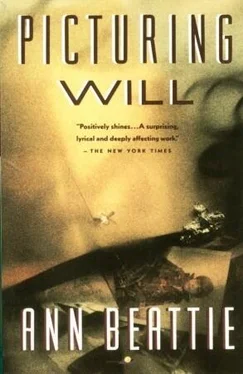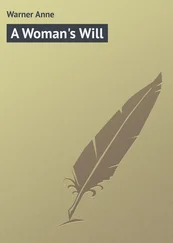She still whispered at night, but now she whispered because of shared intimacies, or because the two of them were planning strategies or conferring about Will’s upbringing. Upbringing — what an antiquated way to think about someone’s childhood: as if the two of them were slowly and competently stretching Will like taffy, when in reality it was all either of them could do to keep up with his energy, his questions, and his desires.
He was thinking about Will in Will’s calmer moments — usually when he was tired, at bedtime. He gave his mother a hard time about going to sleep, but when Mel was there he never minded going to bed. Halloween night, Will had wanted both of them to tell him stories, though. He had wanted to cling, even though they had said nothing about the accident, made no mention of danger. Like all smart children, he had sensed their disquiet. He had let it be known that he thought Where the Wild Things Are was a story for babies. Mel sat at the foot of the bed, chin resting in his cupped hand, while Jody read Will a poem by Auden.
Who was Icarus? Will had wanted to know.
A mythological creature (her soft voice). A boy who tried to fly, but his wings came too close to the sun (matter-of-fact; no preaching to the child), so the wax that had been used to attach the wings to his body melted, and he fell to earth (Mel, hoping to make this less ominous, had whistled on the intake and made a little downward spiral with his index finger).
When they left his bedroom that night, Jody had whispered to him, “It’s so easy to answer questions when all you have to do is recite information.”
Will had looked at his mother so calmly. If the explanation of Icarus’s plight and Mel’s finger whirling through the air hadn’t pleased him, her voice certainly had. Mel knew what it was like to have that voice settle calmly in his own heart: It was the antidote to the sharp sounds of the city, the smooth assurance that she had infiltrated his body to echo even when she was not present.
What he wished, walking along the street in New York, was that it would become clear to her that she should marry him. But since that did not seem likely, he had decided on a strategy — something that would be done at his expense, but perhaps not at so great an expense. Something that might even be like a game that could be well played. As he watched the sidewalk to make sure he did not step on any cracks, he continued to consider carefully Haverford’s offer. It was well known in the business that the mercurial Haverford usually got his way. He had already offered Mel a significantly larger amount of money than he was making at his friend’s gallery, but Mel thought that money alone should not be the deciding factor. Haverford also knew Mel was thinking that. If another price could be struck, however — if, to be specific, Haverford might take an interest in giving Jody a show — that might be the incentive Mel needed to join up with him.
In addition to the enlargements Jody asked Mel to get from the photo lab, he had had four shots blown up to sixteen by twenty and had paid for a rush job. He now carried those photographs in a portfolio he had bought earlier that day at Charrette. People passing him would have thought him an artist, if they paused to look. A thought suddenly went through his head: that the Queen of England always carried a change purse, even though there was nothing in it.
If he could get Jody a show, her self-confidence would soar. And if the Halloween photographs wouldn’t do it, nothing would.
Stepping carefully, he turned the portfolio vertically to hold it like a shield against his chest as he went through the revolving door.
Haverford was there, on a barstool. Tiny bubbles floated up in Haverford’s champagne flute. Haverford smiled, and Mel smiled back. That was it: two people who believed they knew each other so perfectly — who thought they could predict things about the other so well — that they didn’t even need to shake hands.
On an unusually warm April day, Jody took the bus from the airport to Grand Central, got on the subway, exited at Twenty-third Street, walked crosstown to Ninth Avenue, and continued to Mel’s street. Will was spending the weekend with the Vickerses. Jody was supposed to meet the man Mel was considering going to work for — a man whose last name made him sound like a character in a Henry Fielding novel, a name she could not remember, no matter how hard she tried. One of those men named Lord So-and-So, who would wear what they called drawers, and whose days would always be characterized by high propriety.
She smiled to herself. Whenever she imagined people in excessive detail it made Mel nervous, as if she were really hallucinating and bound to bring trouble on herself. But the joking protected her; otherwise, a gallery owner whose name, she’d been told, was often mentioned in the society pages might be a formidable and intimidating figure.
Mel lived across the street from General Theological Seminary, behind which stretched a long courtyard with grass so green it shocked you into remembering the country. Mel had befriended one of the seminarians and had in his possession a key that would open the big iron gate if you reached through the bars, inserted the key into the lock on the other side, and turned it counterclockwise. Some dexterity was needed for this, and some nerve — though the few times someone had spotted her and Mel sneaking in, the person had not batted an eye. Perhaps the seminarians thought there was nothing wrong with finding a way into the courtyard, which might be analogous, to them, to finding a way into heaven. The key could not be duplicated, though, and Mel had the key, so she would have to wait for Mel in his apartment. Also, SoHo Wine was delivering a case of chardonnay for dinner that night, and a woman named Angela, who had run away from Oklahoma to become a Rolfer and had a catering business on the side, was coming over around five to drop off the dinner Mel would serve that night. Jody had met Angela before, at a party she and Mel attended, when she went to get a drink of water in the kitchen. Angela had told her that she had lost her mother when she was a child and had grown up on a ranch in a family of four brothers who treated her like one of the horses. Jody did not ask exactly what this meant. By the time she left the kitchen, she had Angela’s card, and Angela’s boyfriend’s card. Jody could either get Rolfed or get legal advice. Angela had her own staff, which included the dishwasher, who was a teacher of the Alexander Technique and with whom she was two-timing her lawyer boyfriend, and a fleet of people who served the food, among them a dwarf who worked nights when he was between movie-stuntman jobs. He went around tapping people’s knees to see if they needed their wineglasses filled. Jody had wished that Will was with her. Why read fairy tales to your child when you can take him to a party in New York? If he understood that Rolfing and the Alexander Technique were similar to spanking in slow motion and to being made to stand in the corner, he might not have liked that, but he would have liked the dwarf in his blue cap, carrying a bottle of red wine in one hand and a bottle of white in the other. The dwarf was doing just what Will was not supposed to do: carry two drinks at once.
What did Mel think about Jody’s being in his apartment while he was at work? Apparently, it was fine with him. She’d already seen the secrets (such as they were) in the medicine cabinet. Everything else had been put on display to show her how tempting life in New York could be, so she would move in with him. Did she like his crystal champagne flutes, hung upside down under the kitchen cabinet as if they were ordinary wineglasses, which could be hers if she married him? What about the stereo (they could compromise on the volume), the mattress (they could get one larger), the bath towels (if she didn’t like brown, they could buy them in every color of the rainbow).
Читать дальше












